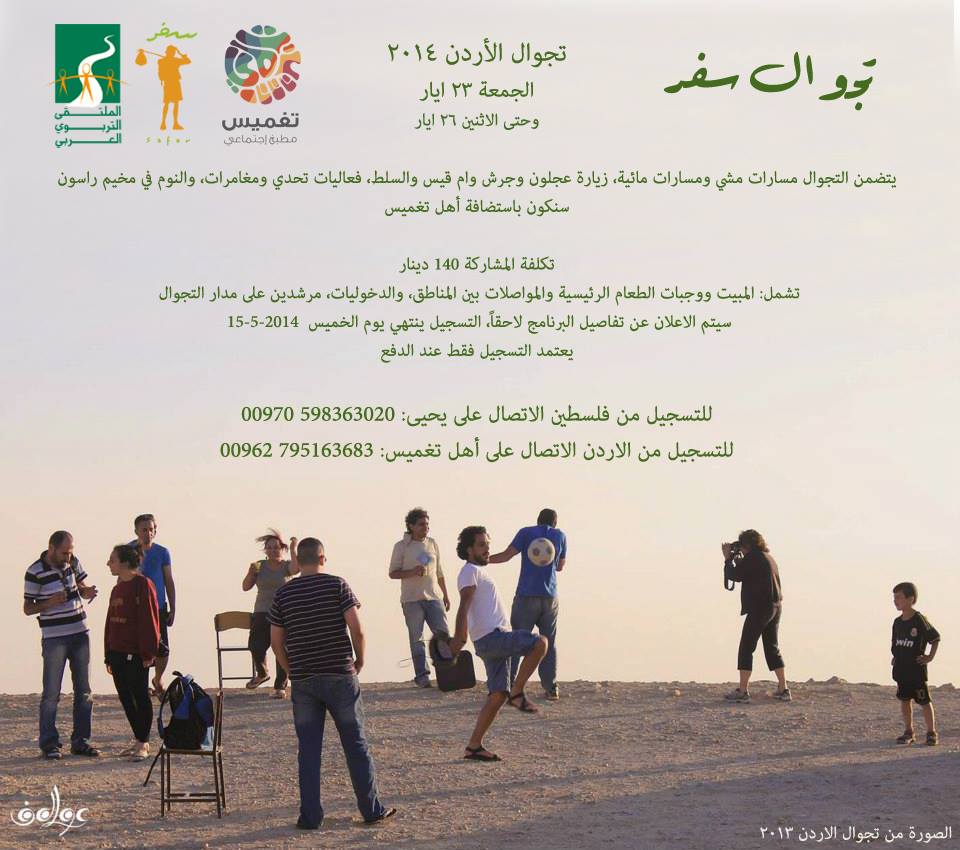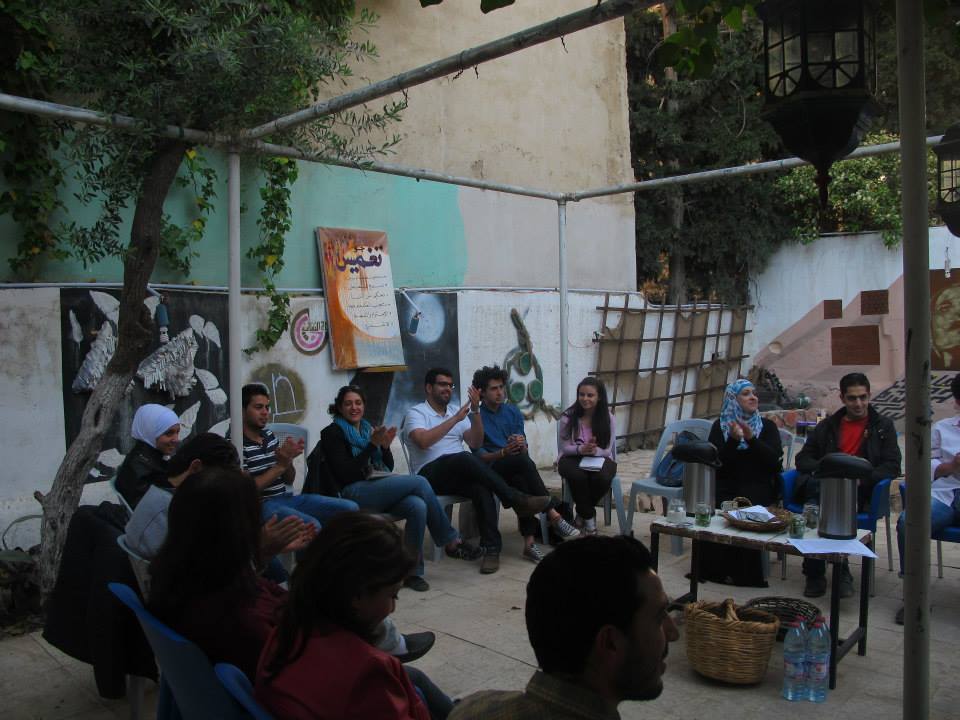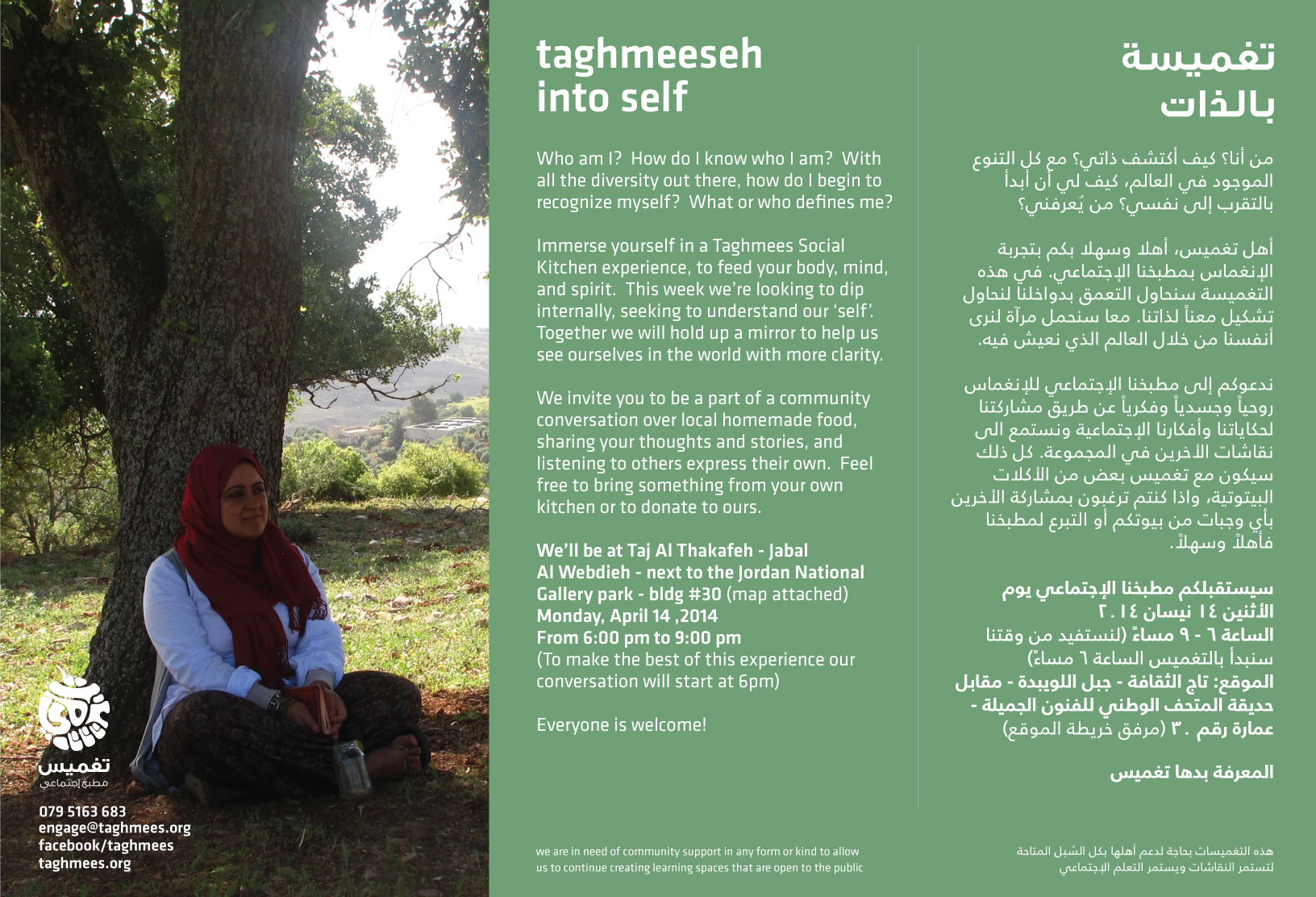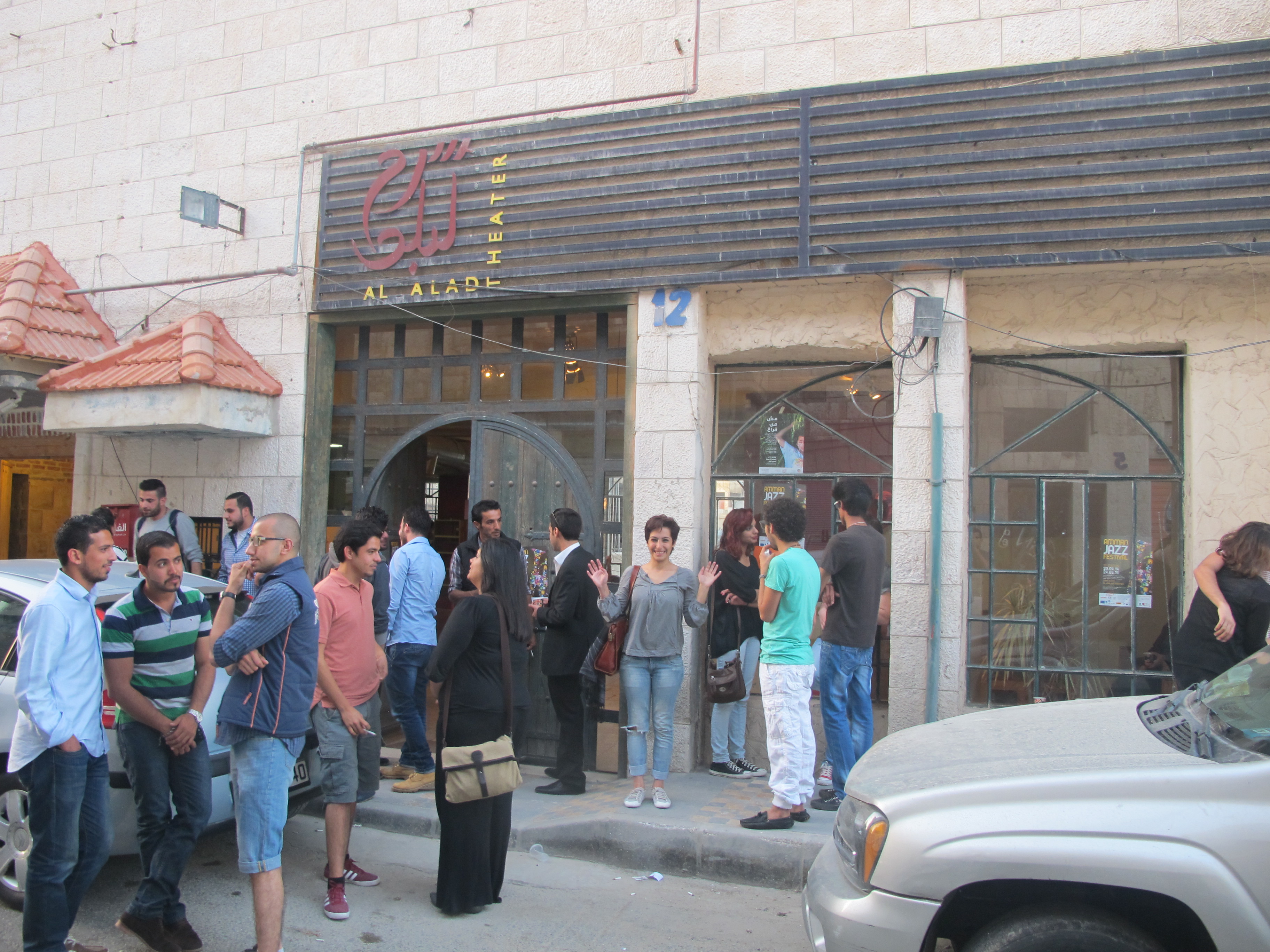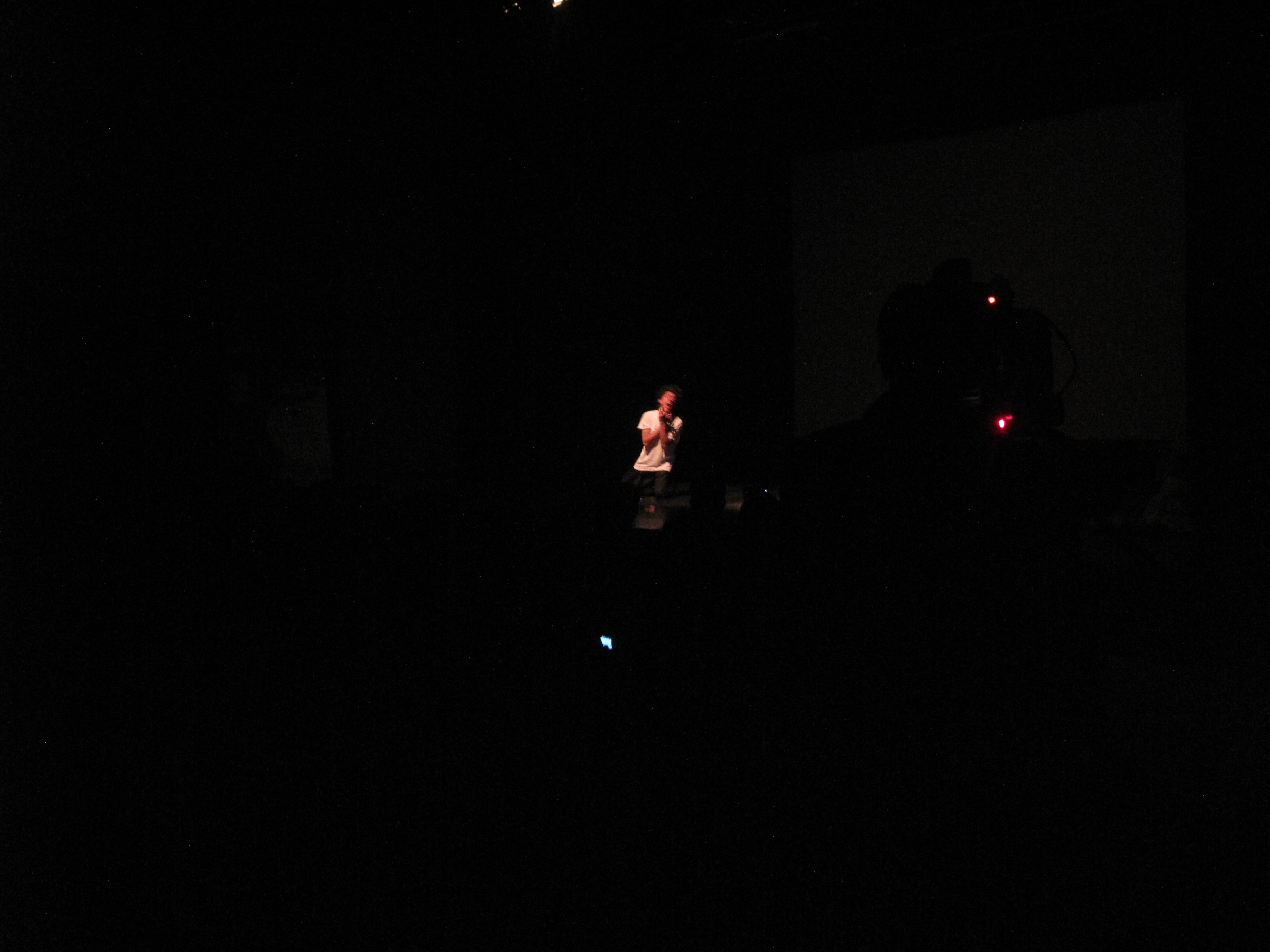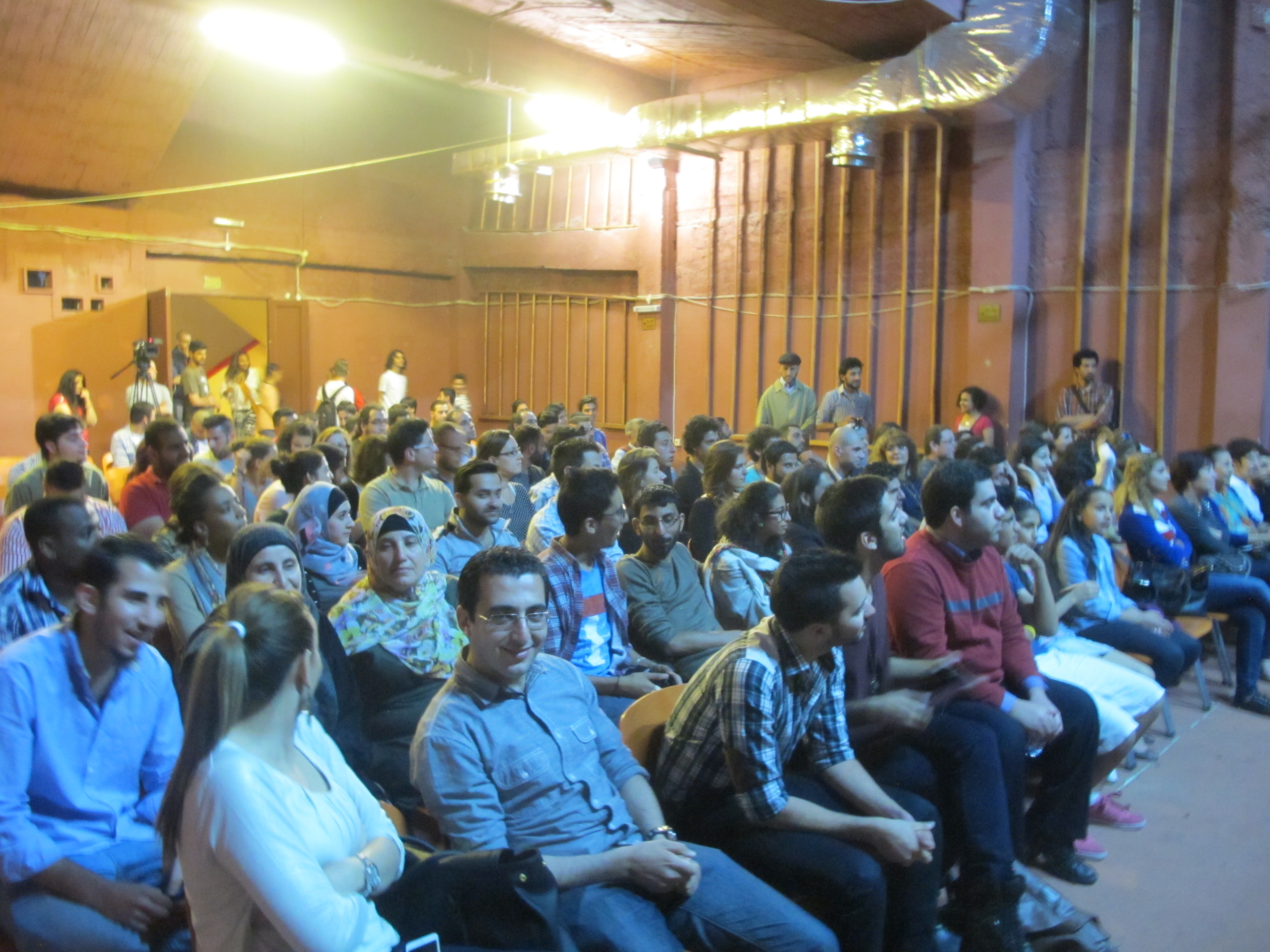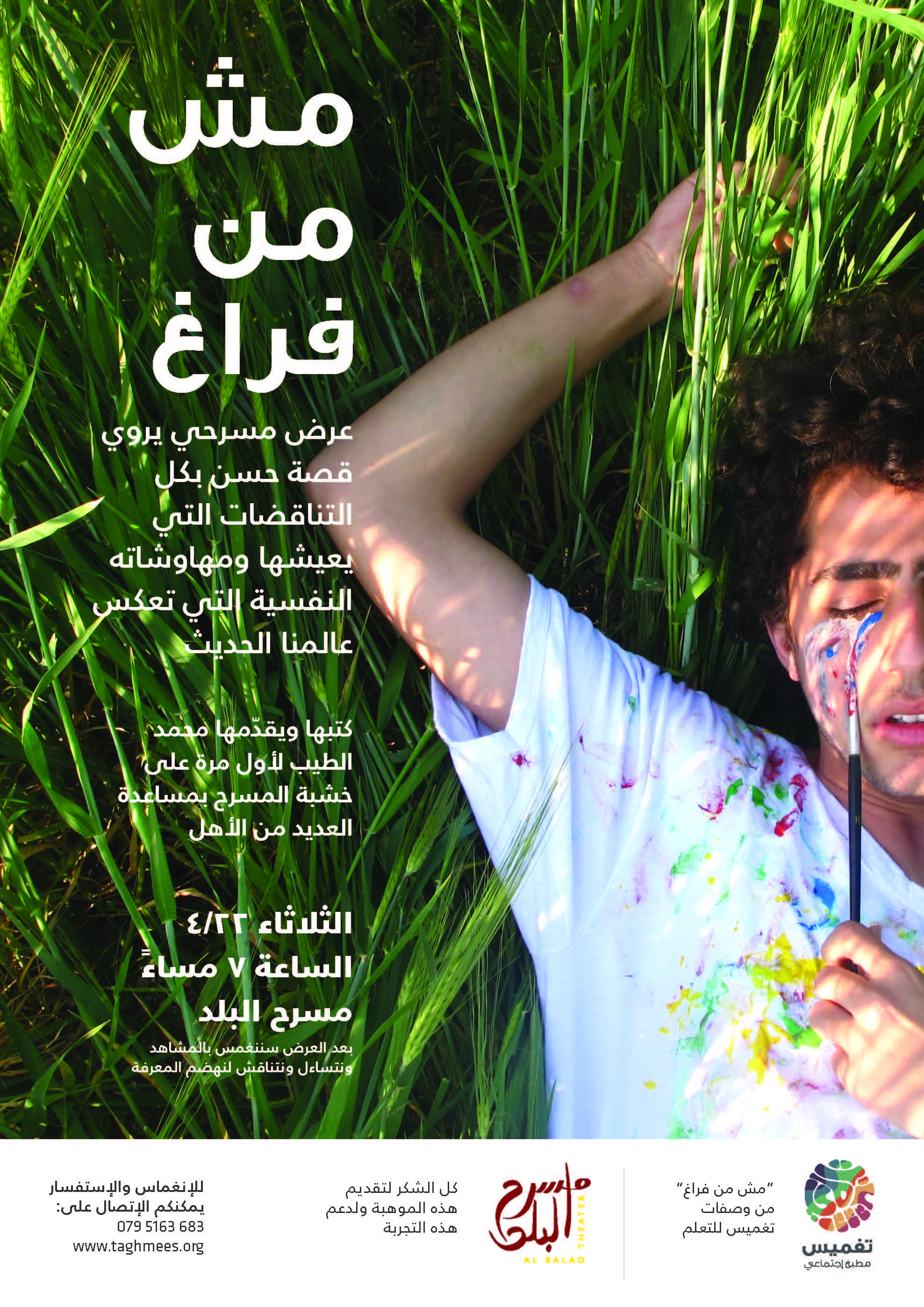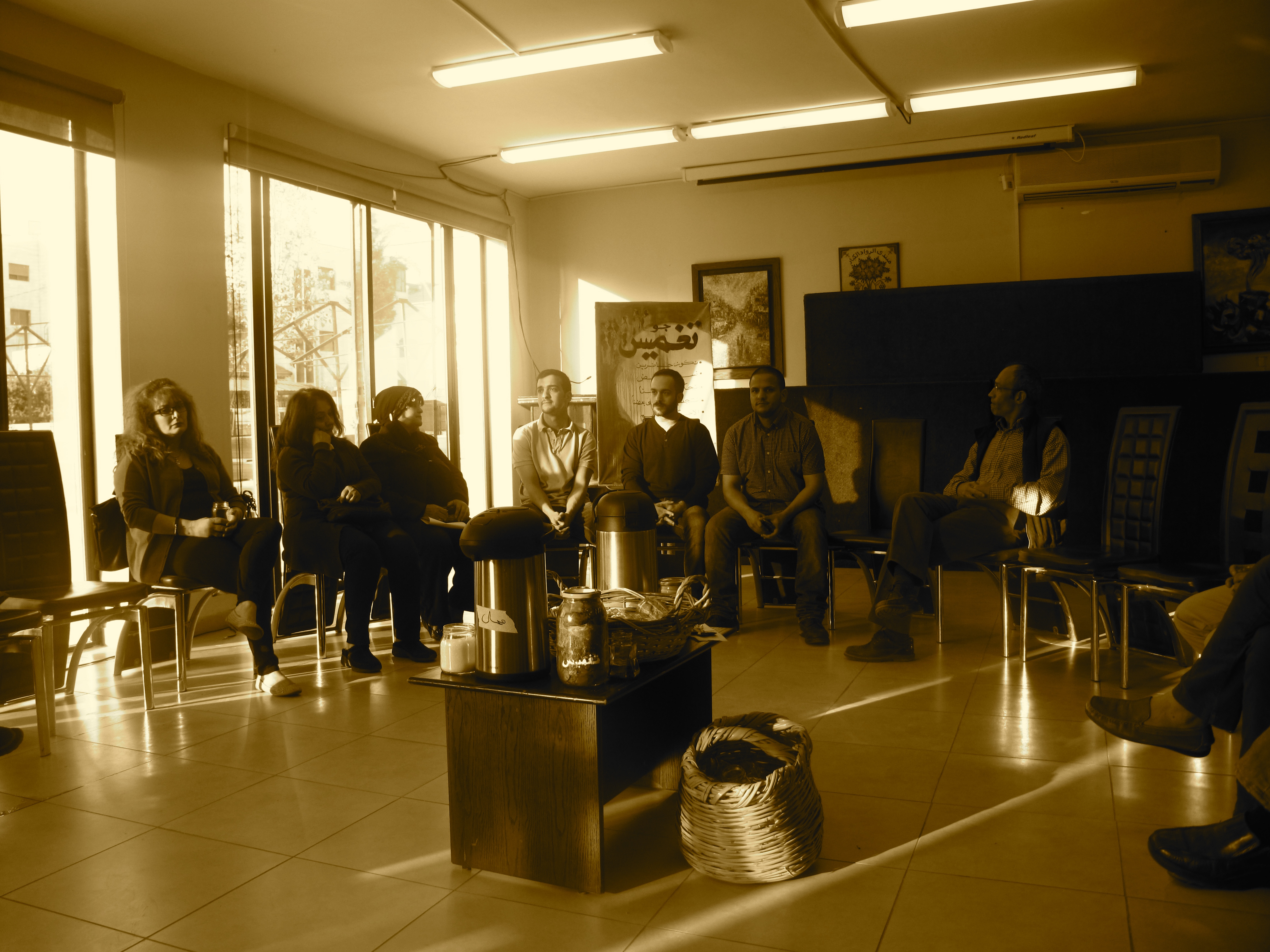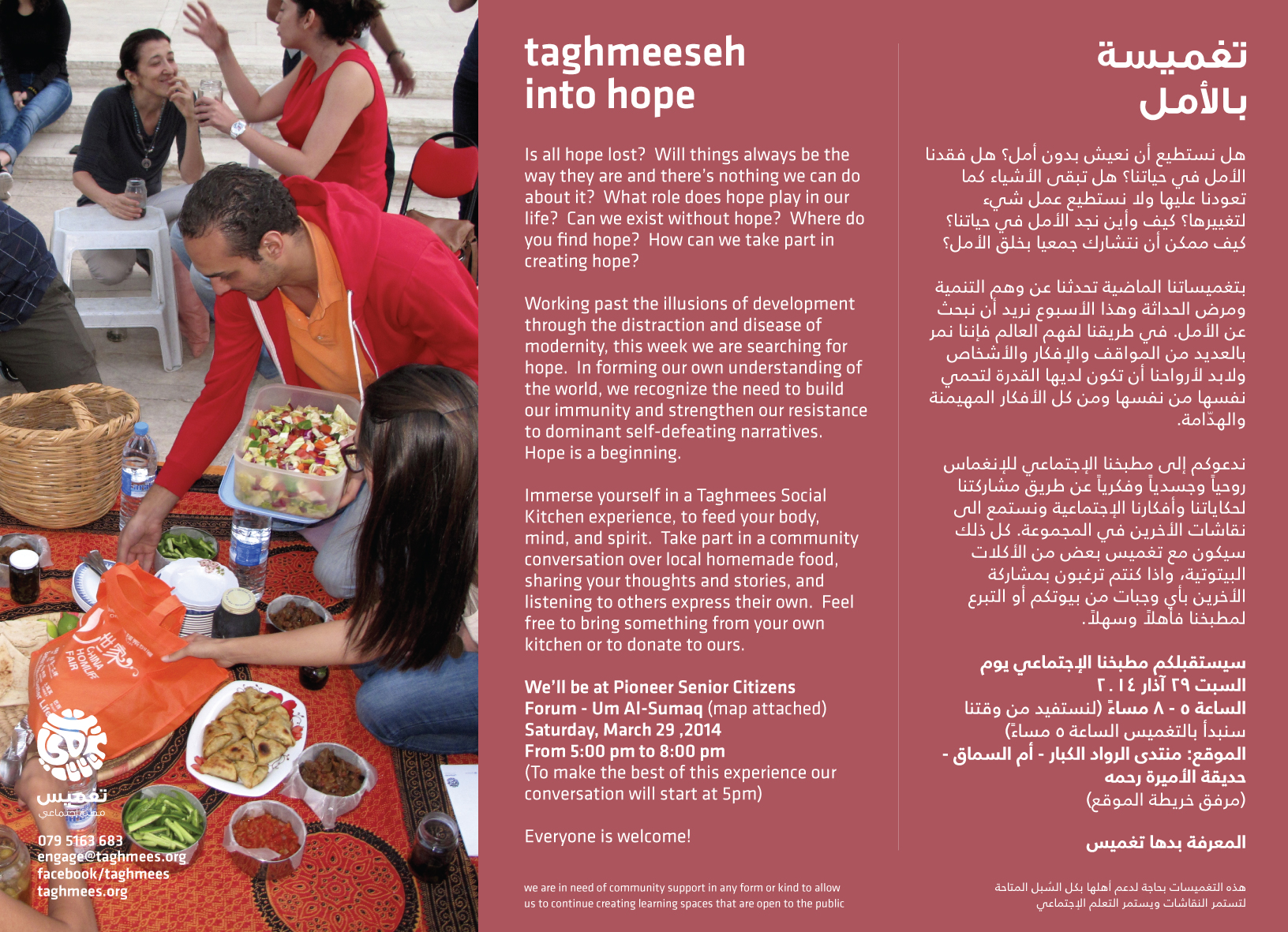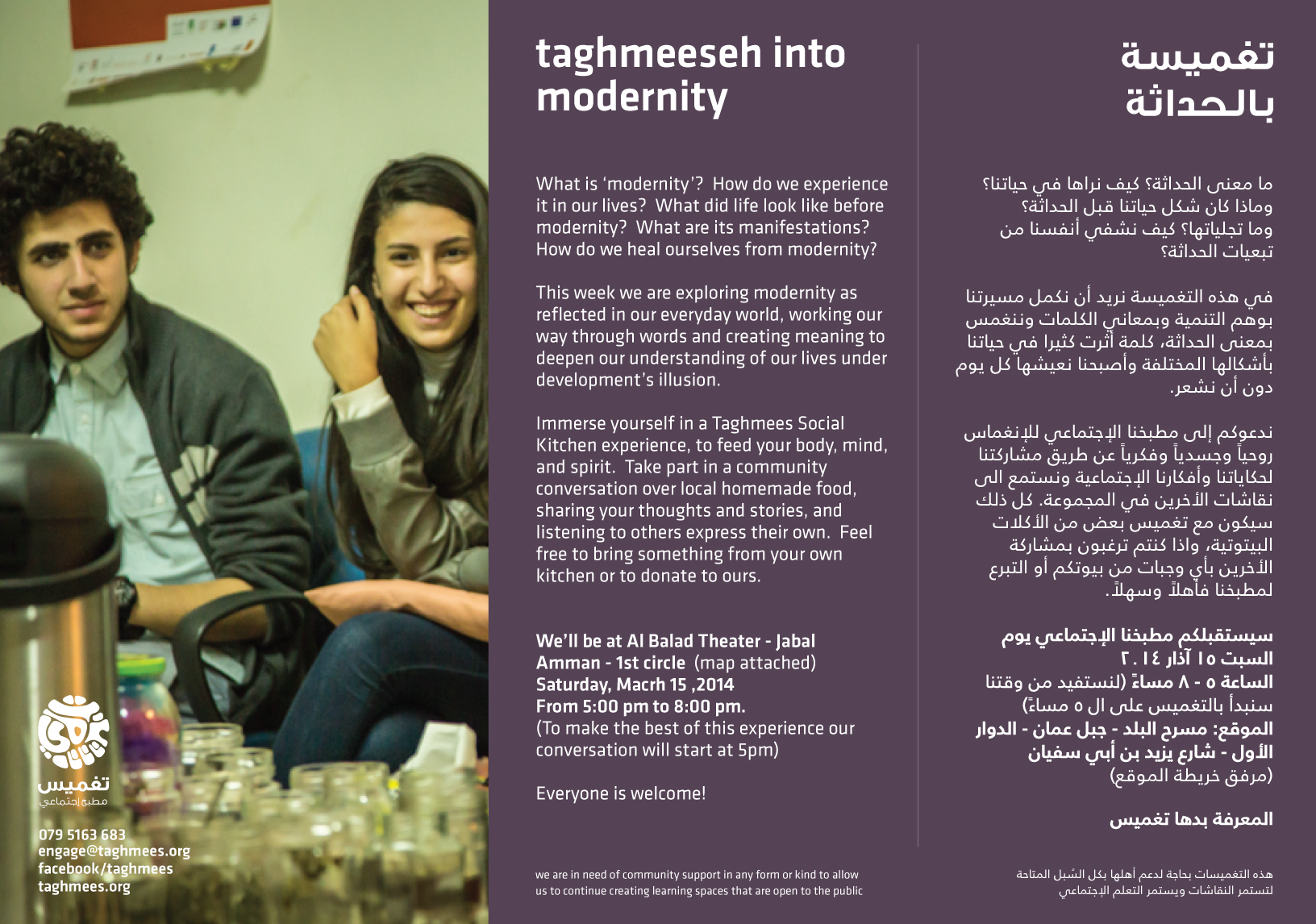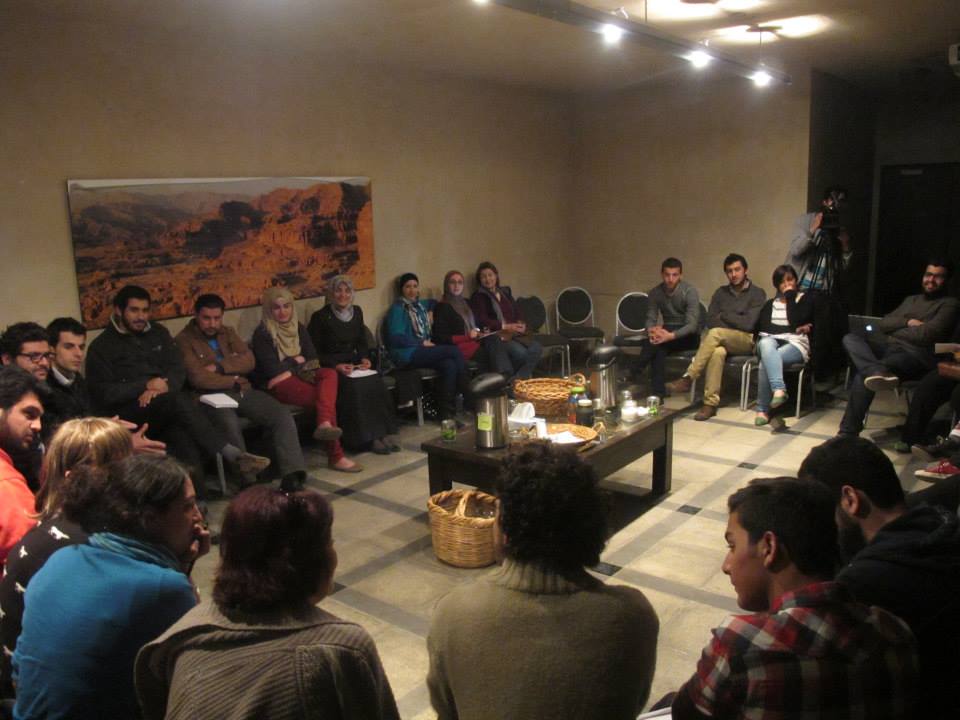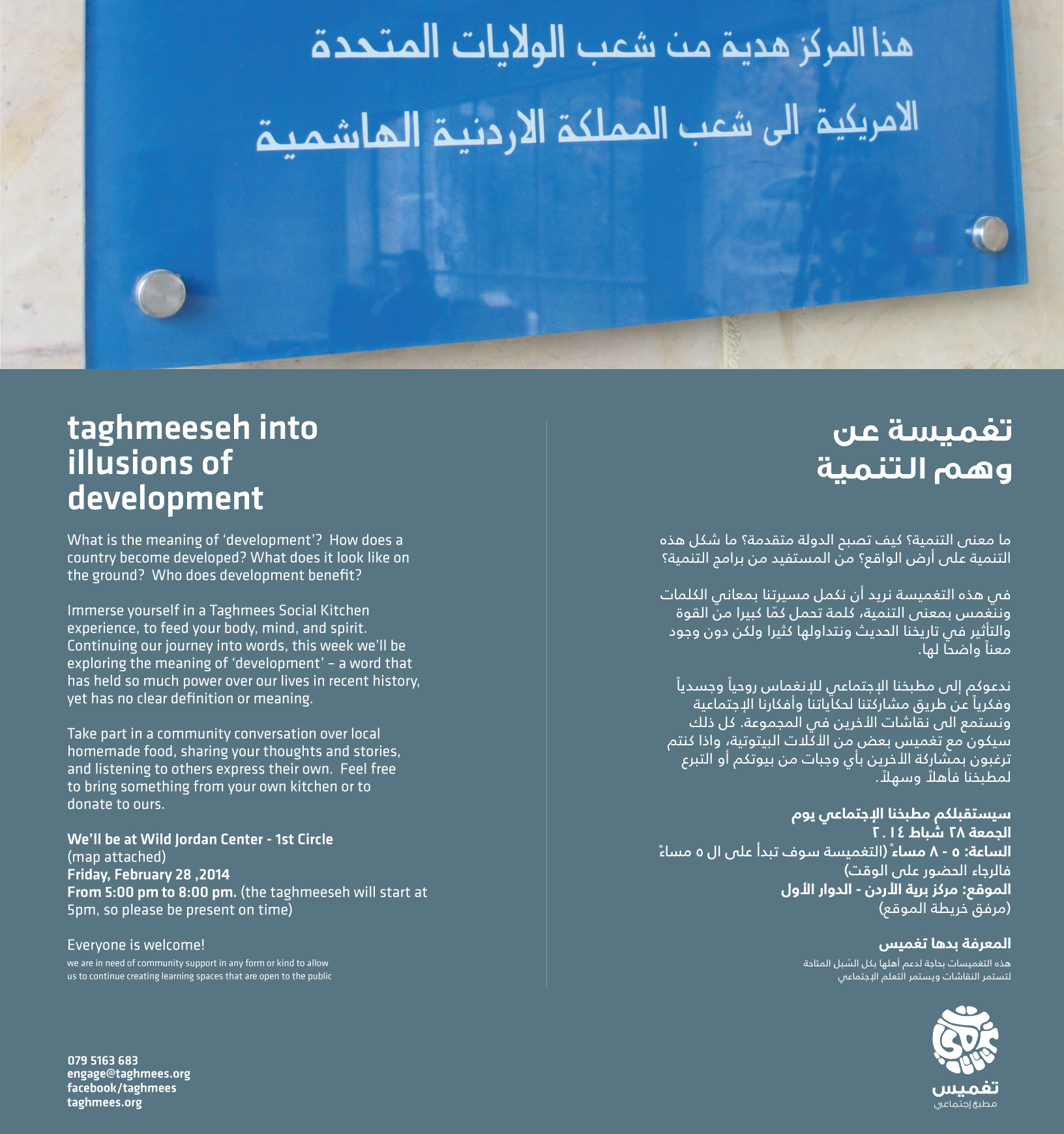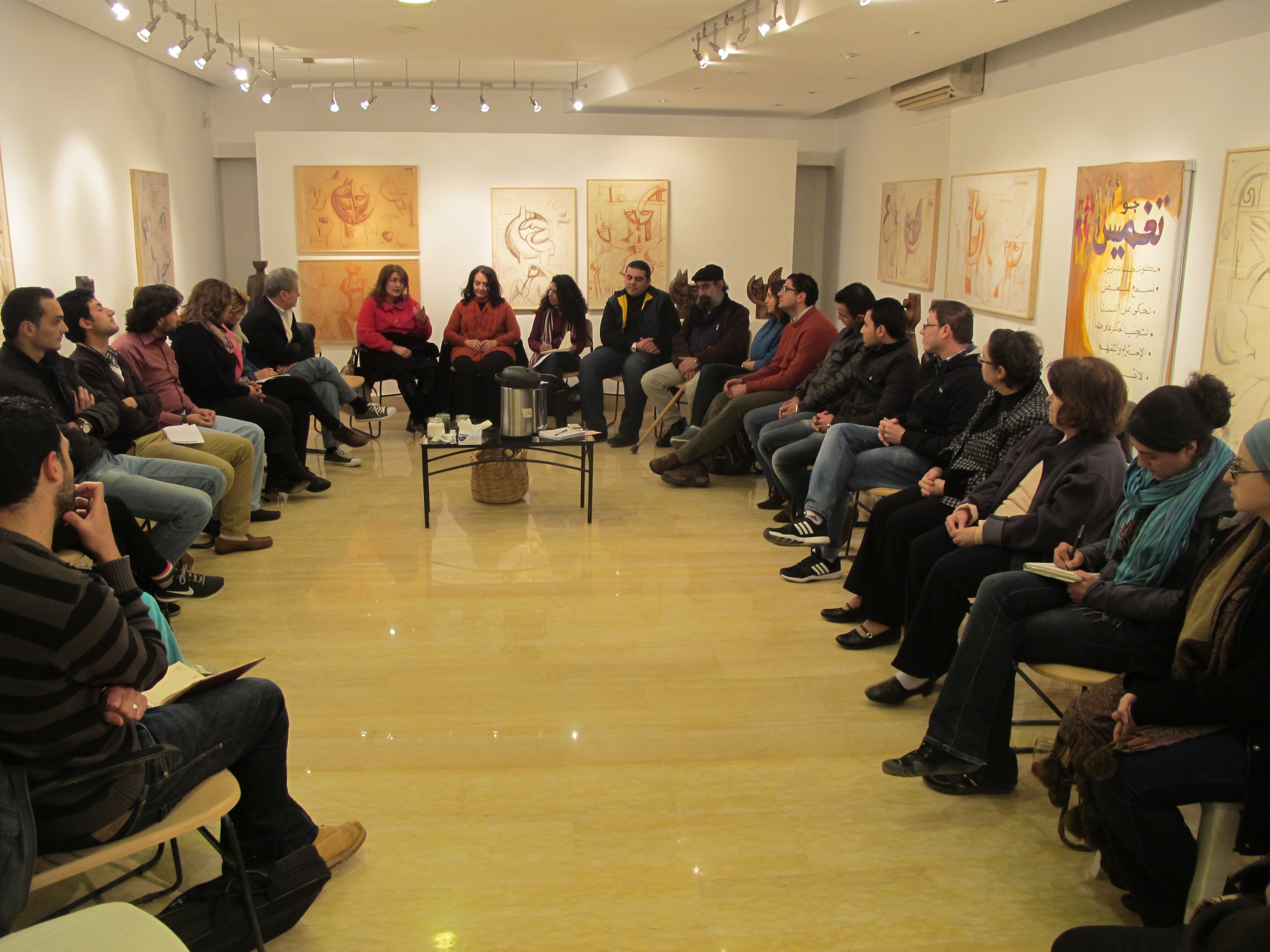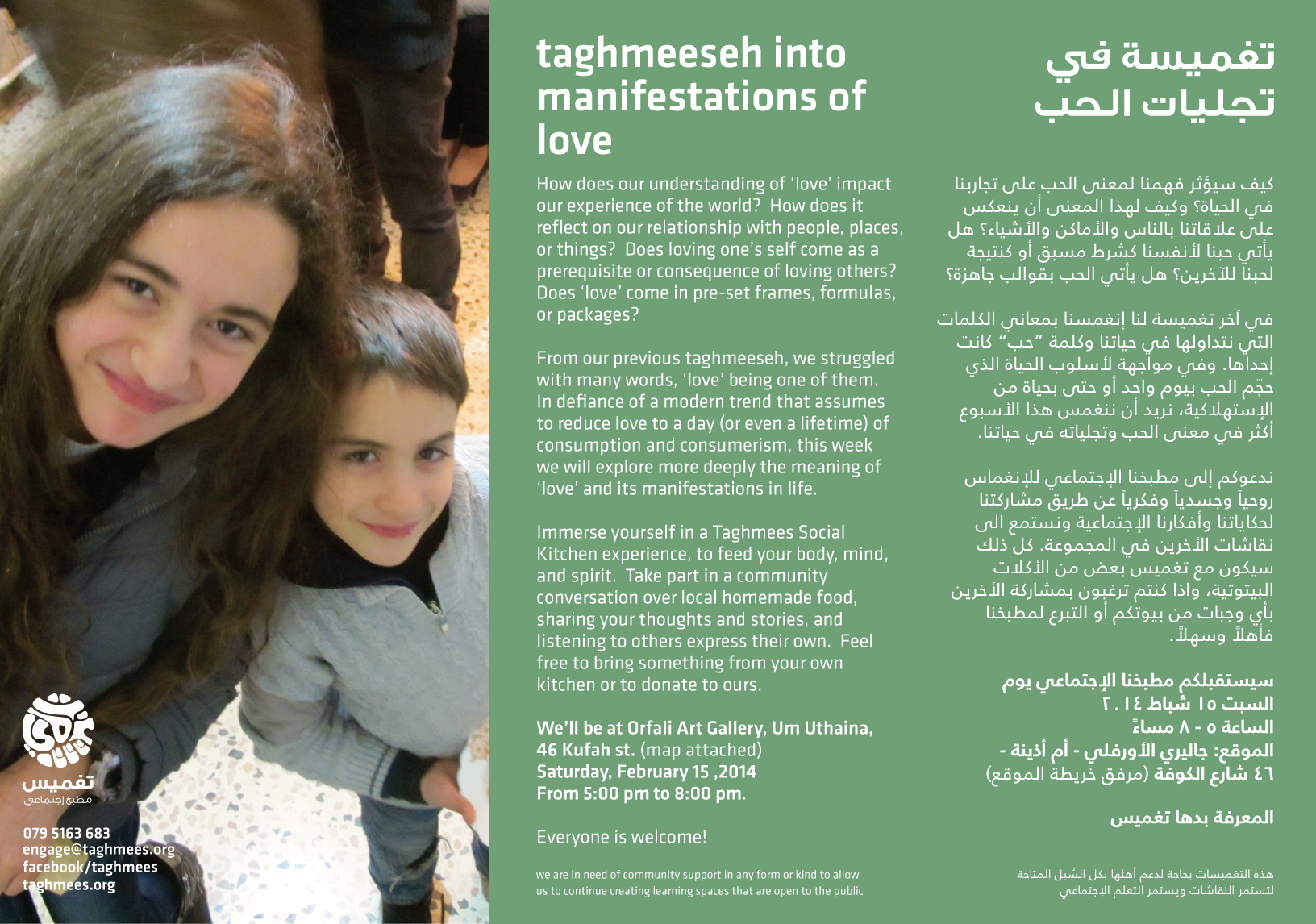Tag Archives: تعلم
أسئلة ما بعد تغميسة بالذات
بتغميستنا بالذات في تاج الثقافة بجبل اللويبدة، تنقلنا بإنغماسنا بين مصادر ومواقف ساعدتنا على اكتشاف ذاتنا وما معنى الذات لكل فرد منا. تعددت الآراء والأفكار والأسئلة. ما هي رحلة اكتشاف الذات؟ ما هي عناصر تكوين الذات؟ ما علاقة الانسان بالمكان؟ ما علاقة الذات بالنجاح والفشل؟ ما مدى ارتباط الذات بالثقافة المفروضة علينا؟ ولكن من الأشياء الجميلة التي ذكرت بان اكتشاف الذات هي رحلة وجماليتها بصعوبتها وبمدى ارتباطها بانسانيتنا بعيدا عما يتم فرضه علينا أو ما نراه من قوالب نمطية جاهزة.
كل الشكر أهل تغميس على حضوركم، كان معنا العديد من الوجوه الجديدة وأخرى أصبحت لا تبدأ التغميسة دون وجودهم وايضا كل الشكر لتاج الثقافة على الإستضافة.
meeting hassan لقاء حسن
بعد لقاء الأمس بعرض “مش من فراغ” تحول الخوف الى عطش للقاء الأهل وتجدد الأمل بالتعلم. الحضور كان يفوق التوقعات، وحضور محمد الطيب على المسرح بمعية صديقة مصطفى الشلبي كان انغماسا بعمق بقصص من حياتنا تعيش بدواخلنا سمح لها محمد بأن تحلق وتدخل أرواحنا لنعيد التفكير بها ونفهمها ونهضم معرفتها.
الصراحة لا نعرف من أين نبدأ الكتابة، كان يوما تغميسيا من الدرجة الأولى أو مجاورة تغميسية رائعة. لنصل الى ٤/٢٢ كان هناك رحلة ضمت العديد من الأهالي. تعرفنا على محمد الطيب في شهر تشرين ثاني عام ٢٠١٣ عندما حضر برفقة صديقة العزيز مصطفى الشلبي لحضور أول تغميسة لهم، كان عمرهما ١٦ سنة مليئين بالطاقة والحيوية والضحك والأمل، وبنفس الوقت كانت تغميساتنا مازالت في بداياتها، تكتشف خطواتها رويدا رويدا.
كانت جلسة مميزة إنغمسنا فيها بروح تغميس، والنقاش كان صريحا لدرجة إننا وبرفقة مجموعة من الأهل لم نرغب لهذا النقاش بأن ينتهي أو بأن نترك بلكونة “مكان” في جبل اللويبدة. بكل عفوية جلسنا بالقرب من بعض نستمع الى قصصنا وندفي أنفسنا من برد أول الشتاء. قبل ساعات من هذه الجلسة كنا أغراب ولكن حميمية النقاش والمكان جعلتنا أقرب الى بعض.
في تلك الجلسة عرّفنا محمد على حسن، ووقف أمام الكل متحمسا على النقاش وسألنا “بتحبوا تشوفوا مسرحيتي اللي عم بشتغل عليها، مدتها ٥ دقائق بس والله ما بطول “، بنفس اللحظة التي وقف فيها محمد سرق إنتباه الكل ولمدة ال٥ دقائق كنا كلنا نسمع ونرى قصة حسن. في تلك اللحظة شعرنا بان حسن موجود داخل كل شخص منا بكل تناقضاته، بقهره والقهر الممارس عليه.
كما ذكرت رند من أهالي تغميس في النقاش، بدأ محمد بكتابة قصة حسن قبل حوالي عام، أخبرها عن قصص سمعها وأثرت فيه وكان يوم العرض بمثابة الإحتفال بتحقيق الحلم والأمل بأشياء جميلة قادمة. لقد عشنا مع محمد وهو يجمع قصص مسرحيته, بدأ محمد يعيش حياة تغميس ليتعلم عن الحياة ويستخدم ما تعلمه لينسج حياة حسن ويقدمها بالعرض “مش من فراغ”. بدأت البروفات ويوم ٤/٩ تم تحديد موعد المسرحية، استمرت البروفات بشكل يومي تقريبا، كل يوم كان مليئا بالتعلم، انضم الينا العديد من الأهل وتقابلنا مع أشخاص رائعين أضافوا الكثير من خبراتهم؛ تناقشنا وإنغمسنا وتعلمنا.
بكل تألق وبراعة، عرض لنا محمد شخصية حسن، شاب يصارع بين عالميه الداخلي والخارجي باحثا عن مساحة له ليعيش حقيقته. من الخارج يعيش الحياه التي إختارها له المجتمع، ومن الداخل خسر روحه وصارع وتعب فقط ليلبي كل ما هو مطلوب منه. قصته تقدم لنا أشكالا مختلفة من العنف والصمت والقهر وتتركنا برسالة للبحث عن الأمل.
هنالك شعور بالفخر لكيف تم تقديم قصة حسن ولوجودنا معه، وهذا الفخر يعود لمحمد الطيب وكل من وقف معه لتقديم هذا العرض المسرحي الإجتماعي. بشغفه أعطى لتغميس بعدا جديدا وكان جميلا بأن نخلق مطبخا إجتماعيا بشكلا جديدا، فشكرا حموده لهذه التجربة التعلمية الرائعة ولكسر حاجز الصمت.
من هذا العرض المسرحي تعلمنا الكثير وبأهمية إدراكنا لكل ما هو حولنا لنخرج بأشياء جميلة نتعلم منها. من أبسط الأشياء نستطيع أن نفعل الكثير، كل ما نحن بحاجة اليه هو إيماننا بأنفسنا وبقربنا إلى بعض ومعرفة كل واحد منا بما يُحسن. نحتاج الى أن نصحى من غيبوبتنا ونحمي ما هو موجود لدينا.
شكر خاص لمسرح البلد وفريقه الرائع، رائد ورزان ولبنى وقابيلا ومعاذ لدعمهم لهذا العرض وإعطاء الفرصة لموهبة محمد لتنمو وليعيش حلمه على المسرح.
وأيضا شكر كبير ليامن عمر، فيصل العزه، أحمد زكي، لبنى خريس، خميس، عبد، بلال حياري، بكر جابر، مراد خواجا، الخالة ماغي، رهف أبو ضحى وكل من كان خلف الكواليس وأعطوا الوقت من حياتهم ليرى هذا العرض النور، وأيضا للعائلة والأصدقاء وأهل تغميس الذين جاؤوا باكرا وساعدوا بالتحضيرات.
ولا ننسى أهل طمي وتعليلة لمشاركتهم روح الكرم والمجتمع معنا، شيء يفوق الجمال.
وأخيرا وليس آخرا كل الشكر لمن جاء ليسمع قصة حسن ولمن كان جزءا من النقاش. من الصعب أن نتحدث عن أشياء حقيقة في حياتنا ومؤلمة في مواقف عامه وبنفس الوقت نرى حسن بداخل كل شخص منا ونرى شخصيات حسن المختلفة التي نخلقها بالمجتمع. تحية وإحترام لكل من تجرأ وشاركنا قصصه وكل من كان جالسا ليسمع ولكل من يريد إن يكمل المشوار بهز عرش الصمت.
We got to know Mohammed Tayyeb last November, when he and his friend Mustafa Al Shalabi came to their first Taghmeeseh. They were sixteen and brimming with life, laughter, and hope, among other things. Our community learning experiment was similarly young, and we were all like toddlers treading water by instinct.
It was a special evening, as we immersed ourselves in sharing and self-reflection around the heart of Taghmees. I remember our conversation being so open and honest that we, among several ahel, were reluctant to go home and leave the warmth of our gathering. Without any formality, we had squeezed ourselves into a tight circle on Makan’s balcony, silhouetted by the city that is our home. No one would believe that several hours prior to that moment we had been mostly strangers to each other.
That was the same night that Mohammed introduced us to “Hassan” for the first time, when overcome with his passion for acting and finding a willing audience. I have held them both in my heart ever since. It was an impromptu 5-minute performance, as Hassan’s story was still in the writing, barely a sketch, but I had met Hassan so many times in my life that I knew him well. In many ways, I was Hassan; and I was everyone who oppressed him. Seeing him in that moment, my heart ached for all of us and was afraid for all of us from all of us.
Over the months, I have watched Mohammed assemble the nuances of Hassan’s life, as though stitching together a quilt from our community. Like us, he has practiced living taghmees as a medium to learn about the world around him, using his learning to flush out the details of Hassan’s story into a monodrama entitled “mish min faragh” (Not from Nothing).
With brilliance and tact, Mohammed depicted Hassan, a young man struggling between his outer and inner worlds. Struggling to be in a world that does not allow for being. His surface had been molded to fit society’s many frames, leaving his core tormented by what he has lost to meet these demands. His story weaves various forms of violence, silence, and oppression, leaving us with a message to look for hope.
After attending Mohammed Tayyeb’s first performance last night at Al Balad Theatre – with support performance by Mustafa Shalabi – my inner Hassan is content. All I have in my heart is appreciation for the respect with which Hassan’s story was told. I feel fortunate to have been there for its telling, honored to stand by his truth, which is merely a reflection of our collective truth.
This appreciation and respect belongs mostly to Mohammed Tayyeb, and everyone who stood by him as he created this important piece of community theatre. With his passion, Mohammed has taken Taghmees to new depths, and we were honored to be a part of his social kitchen. So thank you, 7moudeh, for this amazing learning experience and for breaking a silence that needs to be broken. In doing so, you brought hope into the world.
Special thanks to Al Balad Theatre and its incredible team – Raed, Lubna, Qabeela, Razan, and Muath – for supporting this performance and providing a young talent like Mohammed with a space to learn to live his dream.
Additional thanks to Yamen Omer, Faisal Zaid Al Azzeh, Ahmad Zaki, Lubna Khreis, Khamees, Abed, Bilal Hiary, Bakr Jaber, Murad Khawaja, Aunty Maggie, Rahaf Abu Doha, all those behind the scenes that took time from their lives to make this show happen, and all family, friends, and ahel that came early and assisted throughout.
Also, thanks to ahel Tammey and Ta3leeleh for continuing to share the spirit of generosity and community with us, you are all beautiful.
Last but not least, thanks to everyone who came out to hear Hassan’s story, and those that stayed for the discussion. It’s difficult to talk about something that is so real and so painful in such a public setting, while at the same time looking at the Hassan within all of us and the Hassans we create in the world. But we appreciate all that braved to share and all those that were willing to listen and all those that may be willing to continue breaking the silence.
من وصفات تغميس للتعلم
اليوم كلنا أمل وخوف لتقديم وصفة جديدة من وصفات تغميس للتعلم. سيقف على خشبة المسرح محمد الطيب ليروي لنا قصة حسن، قصة شب يعيش مهاوشاته النفسية وصراعاته مع عالميه الداخلي والخارجي، صراعات تعكس عالمنا الحديث وقد يكون حسن بداخل كل واحد منا بشكل أو بآخر.
“مش من فراغ” قصص حياتيه أخذت محمد حوالي سنة لتجميعها وكتابتها، وحبه للحياة وللمسرح دفعه لتجسيد هذه القصص لكم.
بهذه الوصفة سوف ننغمس بما سوف يقدمه لنا محمد ونتناقش لنهضم المعرفه ونفهم ونتعلم، خلطة جديدة سنعيش فيها جو تغميس بطريقة مختلفة، نسمع لكي نفهم ونكون حاضرين ولا نقمع إختلاف الآراء ولا الموهبة الجديدة وأهم شي نتجنب الحكم على بعض. تجربة سوف نتعلم منها الكثير وبتجاورنا ستكون أرواحنا أقرب الى بعض لان السر هو في الخلطة.
نلقاكم اليوم الساعة ٧ مساء في مسرح البلد، وكل هذه الوصفات التعلمية بحاجة لدعم جميع الأهالي ماديا ومعنويا لتستمر النقاشات ويستمر التعلم الإجتماعي.
سوف نقوم بوضع مرطبان “لمّة الأهالي للتعلم” في المسرح لكل من يريد لهذه الوصفات التعلمية بالإستمرار.
إننا محكومون بالأمل
لهذه التغميسة مكانة خاصة حيث تناقشنا أكثر وأكثر بقصصنا ورواياتنا من الحياة وتحاورنا بالشعر والأدب، جو تغميس كان حاضرا معنا طوال التغميسة.
كل الشكر لمن إنغمس معنا بالأمل وللإحتفال الصغير ولمنتدى الرواد الكبار على الإستضافة.
وكما اقتبس أهل تغميس من ما كتب سعدالله ونوس “ إننا محكومون بالأمل وما يحدث اليوم لا يمكن أن يكون نهاية التاريخ”
0ur recent explorations have left us filled with questions around development, modernization, and life’s many illusions that lead us further from safe food, good health, happy relations, and general well being, we searched for answers in hope. We learned of hopes that have shattered by institutions, and others that were revived or ignited by beautiful people or moments like miracles filled with the possibility of joy and justice.
Nevertheless, we were left with questions: What is hope? Why do I lose hope? Are my hopes tied to predetermined forms and expectations? Are dreams the same as hope? How much does the surrounding environment impact our ability to hope? Whose hopes are more likely to be realized and why? Is hope instinctual or learned? Is hope fixed or dynamic?
Our thanks to the Pioneer Senior Citizen Forum for their hospitality and welcome, and to all those who were a part of sharing the spirit of hope, and to ahel taghmees for the beautiful surprise celebration. It means the world.
أسئلة من تغميسة الحداثة…غذاء ذهني
آخر تغميسة بمعنى الحداثة، كانت لمّة جميلة للأهالي تشاركنا فيها بقصص من حياتنا وتأملنا بتجاربنا بالحياة كمصدر للتعلم. وبطريقنا للبحث عن الإجابات أسئلة عديدة تم طرحها:
ما هي الحداثة؟ كيف نفهمها؟ كيف لنا أن نضعها في قالب واحد؟ ما قيمها؟ ما الفرق بين الحداثة والرأسمالية؟ هل خوفنا من التغيير والتقدم يجعلنا متمسكين بالماضي؟ كبف أثرت الحداثة على حياتنا؟ كيف لنا أن نشفي أرواحنا من الأمراض والدمار الذي شكلته الحداثة؟ كيف نتمسك بذاتنا وبصمتنا التي تعمل الحداثة على مسحها؟ ماذا أفعل يوميا من قلبي وأستمتع به؟
كل الشكر لمسرح البلد ورزان مبيضين لإستقبالهم لأهل تغميس
From our latest taghmeeseh, exploring the meaning of ‘modernity’. It was a beautiful gathering of ahel, sharing many stories from our living history, using life experience as the source for our learning. In our search for answers, so many more questions were raised:
What is modernity? How do we understand it? How can you capture it in one frame? What are its values? As people living in a modern world, do we appreciate and share these values? What is the difference between modernity and capitalism? Is it simply fear of change that makes us question modernity? How has it impacted our lives? How do we heal ourselves from the destructive and diseased nature of modernity? How do we hold onto who we are as people when modernity works to make us forget? What do I do everyday from my heart merely because it makes me better at my core?
Our thanks to Al Balad Theatre for opening their halls and hearts to ahel taghmees.
taghmeeseh into illusions of development reflections تأملات تغميسة عن وهم التنمية
تغميسة يوم الجمعة ٢/٢٨ كانت تجربة تعلم لنا، إنغمسنا فيها بكيف نرى ونتفاعل مع التنمية في حياتنا. بدأنا رحلة التعلم بجولة في مركز برية الأردن “ هدية التنمية للشعب الأردني من الشعب الأمريكي”. هذا المركز تعود إدارته للجمعية الملكية لحماية الطبيعة، مساحة لجميع أهالي المدينة ليتعرفوا على طبيعة الأردن والتنوع الحيوي فيها عن قرب ويتفاعلوا مع الموظفين ومع بعض لتترابط أرواحنا بترابنا وحياتنا. ولكن مع الأسف المركز مهدد في الوقت الحالي بالخصخصة وإعطاءه لمجموعة أتيكو/فخر الدين ليديروه كاملا “مع العلم بأنهم يديرون المطعم داخل المركز”.
بما أننا نعيش منغمسين بالحياة، فتعلُمنا يبدأ بالأسئلة والذي يقودنا الى المزيد منها “الأسئلة تُفرخ أسئلة” ورويدا رويدا تتحول الأسئلة الى فعل يحسن مجتمعنا وأيضا الى المزيد من الأسئلة والتعلم.
هل من الممكن أن نعطي لكلمة التنمية معنا آخر مرتبط بحياتنا ونخرج من دوامة وهم الكلمات من غير فعل؟ كدولة تعتمد على التمويل الخارجي بشكل كبير والقروض الناتجة عن التنمية، هل لنا الحق بمساءلة المؤسسات التي تأخذ هذه القروض وكيف يتم صرفها؟ مع برامج التنمية التي تنفذ بشكلها الحالي وما يأتي معها من تبعات مكلفة علينا جميعا، ما دورنا نحن كأفراد من التأكد من أن هذه المنح تذهب لمن يستحقها ولخدمة المجتمع بدلا من تنفيع شركات وأفراد؟ هل من الممكن أن نقوم نحن كأفراد في المجتمع من آن نمنع خطة تحول المركز الى مجرد مطعم ضمن سلسلة طويلة من المطاعم؟ هل من الممكن من أن نوصل أصواتنا كأهالي وأعضاء وأصدقاء لإستعادة المركز كمساحة للتعلم عن الطبيعة ودعم أهالي المجتمعات التي تعيش حول المحميات؟
بالتعلم والمعرفة نجد الأمل، وعندما يوجد الأمل توجد الحياة. نحثكم جميعا لمعرفة المزيد والتفاعل مع ما يحدث في الوقت الحالي والآن.
كل الشكر لجميع من حضر وتعلم معنا، كل الشكر لفريق الجمعية الملكية لحماية الطبيعة وبرية الأردن على كل الدعم والمساعدة وأيضا كل الشكر لأهل طمي للتنمية الشبابية للمشاركة وتوثيق التغميسة. تعددت التجارب والأراء ولكن خرجنا بمجموعة من الأسئلة، من أين تأتي هذه الأموال المخصصة للمشاريع التنموية؟ ما مديونة الأردن؟ ماذا لو تخيلنا المشاريع الإجتماعية والتنموية من دون تمويل خارجي؟
From Friday’s taghmeeseh, an incredible learning experience into how we experience development in our lives. Our journey began with a tour of the Wild Jordan Center, ‘a gift of development to the Jordanian people from the US American people’, managed by the Royal Society for the Conservation of Nature, the Center is intended to be a space to introduce Jordan’s beautiful wild nature and biodiversity to people in the capital, a place for learning to connect our spirits to our land and life. Today, this Center is under immediate threat of complete privatization through concession to ATICO/Fakhereldin, current operators of the Café within the Wild Jordan Center.
In living taghmees, our learning starts with questions, often leading to more questions, steadily moving towards actions that serve community, which often lead to further learning and more questions still.
Can we give development a new meaning in our lives, one that goes beyond the current illusion of words without action? As a country that is highly dependent on foreign aid and development loans, do we have a right to demand accountability from the organizations taking these funds and how they are spending them? As development comes at a high price to us all, what is our role as people in ensuring that this funding goes towards its announced purpose of serving communities rather than simply serving companies/individuals? Can we together, as people in community, stop the transformation of the Wild Jordan Center into just another restaurant on a long list of chains? Can we raise our voices as citizens, members, and friends to reclaim the Center as a space for learning about nature and supporting communities living around the reserves?
In learning we find hope, and where there is hope, there is life. We urge you to learn more and get involved. There’s no time like the present.
Our thanks to the Center team from RSCN/Wild Jordan for welcome and assistance. And thank you to Tammey for Youth Development for their support in documenting this discussion and participating wholeheartedly.
For more pictures للمزيد من الصور
reflections on “love” taghmeeseh تأملات في تغميسة تجليات الحب
في تغميستنا ليوم أمس كنا محظوظين بأن ننغمس بالحب في جاليري الأورفلي، قصة حب للفن والمجتمع جعلت من هذا المكان حقيقة من قبل الراحلة إنعام الأورفلي واستمر هذا الحب بالتدفق عن طريق بناتها. في الجاليري كنا محاطين بالأعمال الفنية المنحوتة والمرسومة بالحب والتي ألهمت أفكارنا ونقاشاتنا.
خرجنا من هذه التغميسة بكم من الأسئلة أكثر من الأجوبة وللأسف شاركنا النظريات أكثر من القصص مما أخذ جزءا من التعلم المرتبط بتجاربنا بالحياة. هل الحب شعور بيولوجي، كيميائي و/أو جسدي؟ هل يصبح أقوى أو يختفي أو يتغير شكله بمرور الزمن؟ من يضع معايير الحب؟ هل يأتي الحب فقط مع الإستقرار المادي؟ كيف عمل الإعلام والمدنية الحديثة على تشويه صورة الحب ووضعه في قالب واحد؟ ما علاقة الحب بالحرية؟ هل نستمر بإعطاء لقب الحب مع وجود الإستغلال وعدم النضج؟ مثل ارتباط المياه بالتربة والنبات، كذلك يزدهر الحب ليغذينا بالطاقة والأمل والحياة.
من الجميل أن نرى أعداد الأهالي تزداد ونجد المزيد من الناس في مجتمعنا يريدون إكتشاف العالم من خلال تغميس. ولكنها فرحة لم تدم طويلا لإن مع الأعداد الكبيرة يغيب جو تغميس في بعض الأحيان والذي يعطي للجلسة نكهتها في التعلم والإحترام لبعض وللمكان وكيف نسمع كي نفهم وليس فقط لنجيب وبأن نعلق الأحكام ونروي قصصنا ونتكلم من قلبنا.
على عكس الإعتقاد السائد بإن الأعداد الكبيرة أفضل إلا اننا نشتاق للحميمية بالأعداد الصغيرة وبقربنا من بعض بالأرواح ومشاركتنا لقصصنا، جلسات صغيرة نسمح لأنفسنا فيها بان نكون صادقين أكثر، نكشف جزءا من حياتنا بكل خشوع ونفتح مجالا لكي نتقبل أفكارا جديدا ونعيد التفكير بما نعرفه.
ولكن مع كل تجربة هناك شيء جديد نتعلمه اذا كنا صادقين بتأملاتنا. ومن الأشياء التي تعلمناها هو أننا نريد أن نخرج بوصفة جديدة للتغميسات لنعود إلى الفكرة الأساسية بالتعلم الإجتماعي. هذا أجمل ما في المطبخ الإجتماعي بأن المجال دائما متاح لإعادة تشكيل الأشياء ولإحداث فوضى وللبدء من الجديد.
كل الشكر لجميع من غمس وإنغمس معنا في تغميسة الحب ولإلهامنا بإعادة التفكير بالسبب الرئيسي لخلق تغميس وعمل هذه الجلسات التعلمية.
From yesterday’s taghmeeseh into love and its manifestations, we had the pleasure of immersing ourselves in Orfali Art Gallery, a place that was created out of love for art and community by the late In’am Orfali, and kept alive by her daughters as an act of love for their mother. We were surrounded by works of art, sketched, carved, and crafted with love, stirring up feelings and emotions, inspiring our conversation and exploration.
Throughout the evening, we had more questions than answers, unfortunately sharing more theories than stories. Like water to plants, love nourishes, feeding energy, hope, and life. Is love biological, chemical, and/or simply physical? Does it get stronger, fade, or just change in nature over time? Is it a production-based construct, a matter of economic stability, an empirical interaction, and/or a means to an end? Who sets the standards and measures of love? Will love be found only by achieving some measure of material success? How has mainstream media and modernization distorted our images of love to fit into one unlikely frame? How do love and freedom relate and interact? Where do love and power intersect, and how do we love without exploiting or being exploited? If love is exploitative, is it still love?
It’s beautiful to see our numbers growing, and more people within our community striking out to explore life through taghmees. Our joy was only overshadowed by the unfortunate consequence that with large numbers it’s difficult to observe a culture of taghmees that is grounded in mutual respect for each other and the place, in listening to learn and not to respond, in avoiding judgment, and in sharing our personal stories and speaking from the heart.
We’re thankful to all those who came, but look forward to once again reclaiming the intended spirit and values of taghmees for ourselves and our community. Despite common logic that bigger is better, we miss the intimacy of our once smaller circles, believing to our core that learning comes through shared experience and stories, requiring a degree of honesty, humility, vulnerability, compassion, and exchange. But from every experience there is learning, if we’re honest in our reflection.
From our learning, we hope to emerge with a new potential recipe for any future taghmeeseh, working with what is available to experiment anew. After all, this is the beauty we find in being part of a social kitchen, as there’s always room for creation.

